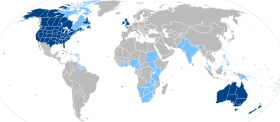
Back Англыз бызшәа Abkhazian Basa Inggréh ACE Инджылызыбзэ ADY Engels Afrikaans Englische Sprache ALS እንግሊዝኛ Amharic Ikiris a sowal AMI Idioma anglés AN Niwenglisc spræc ANG अंग्रेजी भाषा ANP
| Part of a series on the |
| English language |
|---|
| Topics |
| Advanced topics |
| Phonology |
| Dialects |
|
| Teaching |
English is a West Germanic language in the Indo-European language family, whose speakers, called Anglophones, originated in early medieval England on the island of Great Britain.[4][5][6] The namesake of the language is the Angles, one of the ancient Germanic peoples that migrated to Britain. It is the most spoken language in the world, primarily due to the global influences of the former British Empire (succeeded by the Commonwealth of Nations) and the United States.[7] English is the third-most spoken native language, after Mandarin Chinese and Spanish;[8] it is also the most widely learned second language in the world, with more second-language speakers than native speakers.
English is either the official language or one of the official languages in 59 sovereign states (such as India, Ireland, and Canada). In some other countries, it is the sole or dominant language for historical reasons without being explicitly defined by law (such as in the United States and United Kingdom).[9] It is a co-official language of the United Nations, the European Union, and many other international and regional organisations. It has also become the de facto lingua franca of diplomacy, science, technology, international trade, logistics, tourism, aviation, entertainment, and the Internet.[10] English accounts for at least 70% of total native speakers of the Germanic language branch, and as of 2021[update], Ethnologue estimated that there were over 1.5 billion speakers worldwide.[3]
Old English emerged from a group of West Germanic dialects spoken by the Anglo-Saxons. Late Old English borrowed some grammar and core vocabulary from Old Norse, a North Germanic language.[11][12][13] Then, Middle English borrowed vocabulary extensively from French dialects, which are the source of approximately 28% of Modern English words, and from Latin, which is the source of an additional 28%.[14] As such, though most of its total vocabulary comes from Romance languages, Modern English's grammar, phonology, and most commonly used words in everyday use keep it genealogically classified under the Germanic branch. It exists on a dialect continuum with Scots and is then most closely related to the Low Saxon and Frisian languages.
- ^ Oxford Learner's Dictionary 2015, Entry: English – Pronunciation.
- ^ "What are the top 200 most spoken languages?". Ethnologue. 2023. Archived from the original on 18 June 2023. Retrieved 3 October 2023.
- ^ a b English at Ethnologue (26th ed., 2023)

- ^ The Routes of English.
- ^ Crystal 2003a, p. 6.
- ^ Wardhaugh 2010, p. 55.
- ^ Salome, Rosemary (2022). The Rise of English as a Global Language. Oxford University Press, pp. 6–7.
- ^ Ethnologue 2010.
- ^ Crystal 2003b, pp. 108–109.
- ^ Chua, Amy (18 January 2022). "How the English Language Conquered the World". The New York Times. Archived from the original on 1 March 2022.
- ^ Finkenstaedt, Thomas; Dieter Wolff (1973). Ordered profusion; studies in dictionaries and the English lexicon. C. Winter. ISBN 978-3-533-02253-4.
- ^ Bammesberger 1992, p. 30.
- ^ Svartvik & Leech 2006, p. 39.
- ^ Burnley, David (1992). "Lexis and Semantics". In Blake, Norman (ed.). The Cambridge History of the English Language. pp. 409–499. doi:10.1017/chol9780521264754.006. ISBN 978-1-139-05553-6.
Latin and French each account for a little more than 28 per cent of the lexis recorded in the Shorter Oxford English Dictionary (Finkenstaedt & Wolff 1973)
